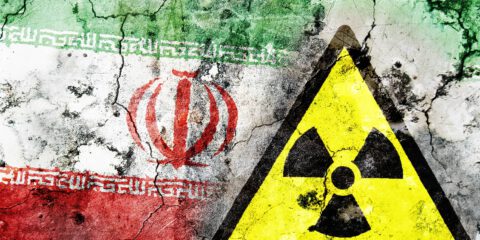Israel should seek to persuade the Biden transition team not to offer Iran any premature concessions; it should outline what would constitute an acceptable, “stronger and longer” deal; find other international actors to support the policy suggested by Israel (possibly France and even Russia); and prepare a viable military option, both to strengthen America’s negotiating hand and as an option in the case of failure to reverse Iran’s present course.
Action is Needed Now
Strategic decisions and orientations which emerge during presidential transition periods often have a formative effect on key policy issues. Thus, President Obama’s transition team decided in 2008-2009 to abandon the obligations contained in the 2004 Bush letter to Sharon; a move which set the stage for a serious breach with Israel on Palestinian issues for years to come.
Policy on Iran will be among Biden’s first challenges. Therefore, it is of vital importance for Israel to engage already now with key members of the incoming Biden team, such as Ron Klain, Anthony Blinken, Michelle Flournoy, and Jake Sullivan.
To the greatest extent possible, such approaches should be made jointly, or in very close coordination with, Israel’s new partners in the Gulf. These countries share Israel’s perspectives on the Iranian regional threat and on the need to block Tehran’s path to nuclear weapons.
This should be done under the general rubric of engaging with the US on the need for a viable negotiating position. After all, even in his controversial congressional speech of March 2015, Prime Minister Netanyahu made it clear that Israel does not rule out an agreement with Iran, and that an agreement significantly better than the JCPOA is possible.
The Immediate Task: Retaining the Leverage of Sanctions
For Israel, for Iran skeptics in Washington, and for her partners in the region, the first operational priority is to persuade the incoming US national security team to maintain full leverage on Iran. Sanctions against Iran should not be lifted as a “gesture” without a verified Iranian return to the status quo ante (at least) in terms of LEU stockpiles and ongoing enrichment activities.
Iranian Foreign Minister Zarif’s siren song (as published in The New York Times) must not be listened to. Zarif speaks of engagement only if the US first removes sanctions. This would be the one sure way to bring about the collapse of any meaningful negotiations. A failure to sustain the current significant pressures on Iran will dramatically reduce, rather than enhance, the chances of reaching and implementing an acceptable agreement.
The Biden-Harris campaign has spoken of a return to the JCPOA; albeit, as Tony Blinken has suggested, in a “stronger and longer” version. This does not and should not commit the President-elect to accept Tehran’s terms and demands. Iran is now in undeniable breach of its obligations under the JCPOA, particularly in terms of the size of its enhanced uranium stockpile. The removal of this stockpile, and an end to all enrichment beyond JCPOA limits, must be a precondition for the easing of sanctions.
In parallel, this point should also be made by Congressional action, through legislation if possible or at least via a “Sense of the Congress” resolution underlining the need to negotiate from strength. Given the collapse of demand (and of prices) in the energy markets, the opportunity costs of retaining the sanctions are not too steep, and Europe can be encouraged to follow suit.
Defining Acceptable Goals
Israel’s position never has been that no deal with Iran is possible, or desirable. Netanyahu explicitly has stated that four matters need to be dealt with to turn the JCPOA from a dangerous and even disastrous debacle into a good agreement; and agreement that will contribute to regional stability instead of undermining it.
Most importantly, the so-called “sunset clauses” must be renegotiated to push much further into the future – or better yet, postpone indefinitely – the point in time in which Iran will be free to enrich uranium as it sees fit (i.e., it would be free to “dash” towards a nuclear bomb).
As things stand, the JCPOA limits on enrichment gradually will be lifted by the middle of this decade. Given the detailed plans for constructing a nuclear device which we know that Iran has, this would mean a rapid shift across the entire region into a highly destabilizing nuclear arms race.
Another aspect of a “stronger” agreement should be a robust inspections regime which would no longer depend on Iranian goodwill. This must be accompanied by a resolution of all question marks still hanging over PMD (the Possible Military Dimensions) of the Iranian nuclear program.
A new agreement with Iran also must curb Iran’s regional destabilization activities. In Lebanon, Syria (most recently, on Israel’s border), Iraq, the Gaza Strip, and Yemen, Iranian proxies are either in full control or in contention for ultimate power. A clear commitment from Iran to desist from the practices of subversion and war-by-proxy must be part of any future deal.
A fourth and equally important matter has to do with the development and deployment of ballistic missiles in Iran. Since such IRBMs are the only reliable means of delivery for the developing Iranian nuclear arsenal, the denial of this capacity is of strategic importance. Indeed, halting the Iranian missile program would greatly reduce the future utility of the nuclear project. Therefore, this matter must be included in an ultimate package deal with Iran. In the meanwhile, the West must insist on strict implementation of the 2015 UN ban on Iranian ballistic missile activities (UNSCR 2231, Annex B, paragraph 3).
Coopting Allies and Partners
The plan presented above is not a burden which Israel should carry alone. The regional and the political dynamics have changed since 2015. At that time, Arab countries (mainly the UAE and Saudi Arabia) held their tongues in public, despite their fervent support for the Israeli position in private. Nowadays, the Gulf partners to the Abraham Agreements, as well as Saudi Arabia, no longer fear to be seen standing shoulder-to-shoulder with Israel. They openly have denounced the Iranian regime (replete with comparisons to the Nazi regime). While Biden’s relationship with the Saudis might be tense, no American president, senator or congressperson can fully ignore the positions of Gulf countries. (Their energy clout may have been greatly reduced but their sovereign wealth funds are still huge.)
In parallel, there may emerge a unique opportunity to close ranks with the French (and with Boris Johnson’s government in London) on the Iranian question. On several issues (above all, the struggle for hegemony in the eastern Mediterranean, against Turkey), Jerusalem, Abu Dhabi and Paris now see eye-to-eye. On Iran, during the negotiations leading to the JCPOA in 2015, the position of France was often the most robust. In 2018, President Macron was willing to reach an operational understanding with Secretary of State Pompeo on the points listed above, and particularly regarding the sunset clauses. With France and Britain taking a firm stand, it may be possible to generate a common ground between the US and its European allies which would address the concerns raised by Israel and Gulf states.
An intriguing prospect would be some level of understanding with Moscow, which has no wish to see Iran join the club of nuclear military powers. There are significant points of leverage and incentives that could induce President Putin to cut a deal; something that would legitimize Russia’s role in world affairs in return for Russian cooperation against Iran. Tensions between Russia’s purposes in Syria and those of Iran and its agents there already are rising. And, in the eastern Mediterranean, Russia is already aligned with Israel, Egypt, Sudan, Greece and Cyprus, against Turkey and Iran.
The Need for a Credible Military Threat
Last but certainly not least, it should be clear to the incoming US national security team that any attempt to negotiate must be, can be, and (as far as Israel is concerned) firmly will be backed by a credible military threat (CMT).
While the US should also show signs of possessing such an option (something that even the Obama administration did when it was building up the case for sanctions), Israel’s independent military options, and a clear message about Israel’s freedom of action, are of strategic value.
A semi-overt Israeli CMT serves two purposes. First, it lends energy and urgency to the efforts to force Iran to accept the key terms outlined above. If should be clear (as was the case in 2010-2012) that the alternative to sanctions and a “good” agreement will not be acquiescence in a “bad” agreement, but rather a pathway to war.
Second, the CMT offers Israel an alternative course of action if negotiations with Iran fail; and indeed, they are likely to, given Iran’s intransigence. Of course, the military threat must be credible and implementable. There is a fine line between divulging operational plans and signaling generic capabilities, and Israeli leadership/the IDF will have to determine where this line lies. Nevertheless, closer cooperation between Israel and the UAE, and the possession by Israel of certain bunker-penetrating ordnances, can play a role in delivering the right message.
JISS Policy Papers are published through the generosity of the Greg Rosshandler Family.
Photo: Bigstock











 - בניית אתרים
- בניית אתרים